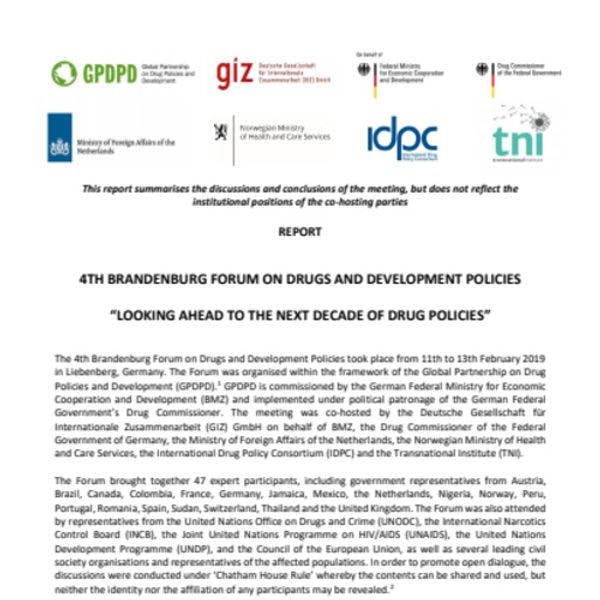4e Forum de Brandenburg sur les politiques des drogues et de développement, orienté vers l’avenir des politiques des drogues dans les dix prochaines années
Des représentants du gouvernement, de la société civile et de la collectivité ont discuté de l’état de la situation des débats à Vienne, d’évolutions dans les domaines des droits humains, du développement et de la santé publique, ainsi que de nouvelles tendances.
Pour en savoir plus, en Anglais, veuillez lire les informations ci-dessous.
The 4th Brandenburg Forum on Drugs and Development Policies took place from 11th to 13th February 2019 in Liebenberg, Germany. The Forum was organised within the framework of the Global Partnership on Drug Policies and Development (GPDPD). GPDPD is commissioned by the German Federal Ministry for Economic Cooperation and Development (BMZ) and implemented under political patronage of the German Federal Government’s Drug Commissioner. The meeting was co-hosted by the Deutsche Gesellschaft für Internationale Zusammenarbeit (GIZ) GmbH on behalf of BMZ, the Drug Commissioner of the Federal Government of Germany, the Ministry of Foreign Affairs of the Netherlands, the Norwegian Ministry of Health and Care Services, the International Drug Policy Consortium (IDPC) and the Transnational Institute (TNI).
The Forum brought together 47 expert participants, including government representatives from Austria, Brazil, Canada, Colombia, France, Germany, Jamaica, Mexico, the Netherlands, Nigeria, Norway, Peru, Portugal, Romania, Spain, Sudan, Switzerland, Thailand and the United Kingdom. The Forum was also attended by representatives from the United Nations Office on Drugs and Crime (UNODC), the International Narcotics Control Board (INCB), the Joint United Nations Programme on HIV/AIDS (UNAIDS), the United Nations Development Programme (UNDP), and the Council of the European Union, as well as several leading civil society organisations and representatives of the affected populations. In order to promote open dialogue, the discussions were conducted under ‘Chatham House Rule’ whereby the contents can be shared and used, but neither the identity nor the affiliation of any participants may be revealed.
Sujets
Régions
Profils associés
- Global Partnership on Drug Policies and Development (GPDPD)
- Deutsche Gesellschaft für Internationale Zusammenarbeit (GIZ)
- International Drug Policy Consortium (IDPC)
- Transnational Institute (TNI)
